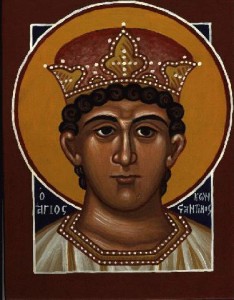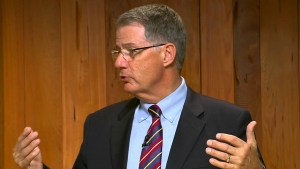The two-kingdoms ethic rejects theocracy from the right or the left.
theocracy
Is Natural Law "Theocratic"?
Lee Irons raises this question in relation to the discussion that has been occurring here relative to natural law and homosexual marriage. Lee argues, “My problem with this is that, if logically carried through, this will lead to a view of civil government . . . Continue reading →
Yet Another Reason Why a Reformed Two-Kingdoms Ethic is Necessary
Critics of the two-kingdoms ethic should consider this story from Salon.com. Julie Hirschfeld Davis reports that Roman bishops and archbishops have been influential in lobbying for a social-democrat version of “health care reform.”
More on Theocracy (Updated)
A brief response to Micah Burke. He’s unhappy that I want to exclude theocrats and Baptists from the definition of the adjective “Reformed” and he argues, in effect, that I’m being selective. I’ve explained at great length here why those who deny . . . Continue reading →
On Christian Freedom, Two Kingdoms, and the Right Use of Scripture
I’m grateful that you’re reading Recovering the Reformed Confession and that you took the time to write. I don’t know that I will be able to satisfy your concerns. It may be that we disagree on some basic issues. Let me try . . . Continue reading →
Audio: John Bolt on What America Owes Jesus as Lord-Theocratic Fears and Patriotic Ambitions
It’s been delightful to have Calvin Theological Seminary prof, John Bolt, on campus for the last two days. He spoke Wednesday on Herman Bavinck and yesterday on “quiet theocracy.”
The Myth of “Christian America”
Every four years (and in the interim) the question of whether we should regard the USA as a “Christian” nation re-emerges. There are three ways in which this question might be considered, sociologically, historically, and biblically-theologically. Under each rubric the case for . . . Continue reading →
The Revision of Belgic Confession Article 36 on Church and State
Eugene Osterhaven called this “the most difficult and disputed” article in the confession.1 As will appear below, the desire to revise this article has existed in the Reformed churches in both the Netherlands and in the USA since the late 19th century . . . Continue reading →
The Abiding Validity Of The Creational Law In Exhaustive Detail
A correspondent to the HB writes: People can gloss over the term all they want, but secularism is still what it is, a rival religion and ethos to Christianity. The real divide between the FV and anti-FV crowd began with Van Til . . . Continue reading →
The Real Danger Of Theocracy In America
Since evangelical re-engagement with social and cultural issues in the mid-1970s, symbolized by the 1976 election of a self-professed born-again, Southern Baptist (Democrat) from Georgia to the White House, in the wake of the Watergate scandal, against the background of the Moral . . . Continue reading →
Boston: The Judicial Laws Were Temporary. The Moral Law Is Permanent
Secondly, There are three sorts of laws we find in the word. 1. The ceremonial law, which was given by Moses. This bound only the Jews, and that to the coming of Christ, by whom it was abrogated, being a shadow of . . . Continue reading →
New Resource Page: On Religious Liberty
The first war fought in the name of the new American Republic was the “War for Independence” (1775–83). In the Declaration of Independence (1776), the American founders declared, in the preamble, “ We hold these truths to be self-evident, that all men . . . Continue reading →
The Strange Persistence Of Theocracy In America
It is a deeply-held conviction among more than a few American Christians that the United States was founded as a Christian nation and that it was such until relatively recently. Further, it is widely thought that if only there were a religious . . . Continue reading →
Did Abraham Kuyper Become An Anabaptist? Updated With A Postscript
Is theocracy, i.e., an state-established religion and the state enforcement of religious orthodoxy essential to Reformed theology, piety, and practice? That is the question asked and answered recently by Craig Carter, a former Anabaptist turned Particular Baptist theologian in response a recent . . . Continue reading →
Suicide By Theocracy
If American evangelicalism dies, suicide will be the cause of death listed on the official Coroner’s report. American evangelicalism will likely not die due to external persecution. Historically, persecution tends to strengthen the church. If it dies, it will die because it . . . Continue reading →
What’s Going On Right Now: Sex, Race, Politics, and Power with Dr. W Robert Godfrey (3)
In this third session of Dr. Godfrey’s Sunday school class at the Escondido URC, he develops how Christianity fared under Christendom. He explains the trajectory of challenges Christianity faced as it became wealthy and influential and, sadly, moved away from the gospel. . . . Continue reading →
Pew Poll: Christendom Lives In The Hearts Of Many Americans
On October 28, 2021 The Pew Research Center published another of their fascinating and illuminating polls. This one surveyed the attitudes of Americans on the relations between church and state. For our international readers the USA has a written constitution (other nations . . . Continue reading →
Of Christians And Rights
One of the crucial questions in our current moment of governmental overreaches has to do with how we understand our rights as Christians living in this world. Many of our current discussions evidence a great misunderstanding of our calling as believers in . . . Continue reading →
Imprecatory Prayers (Or The Theonomist In Each Of Us)
Tish Harrison Warren, who writes for Christianity Today, who is a priest—a topic for another essay— in the Anglican Church in North America, has published an editorial in CT calling for Christians to pray imprecatory prayers against Vladimir Putin. She begins with . . . Continue reading →
Roman And Protestant Integralists Together
Or Why An Established Religion Is A Really Bad Idea
Integralism and Protestant theocracy are twin movements of which our readers should be aware. The first is a Romanist movement. The second is a movement among a small but visible band Protestants who seek a similar outcome. Roman Integralism Romanist “integralists” like . . . Continue reading →









